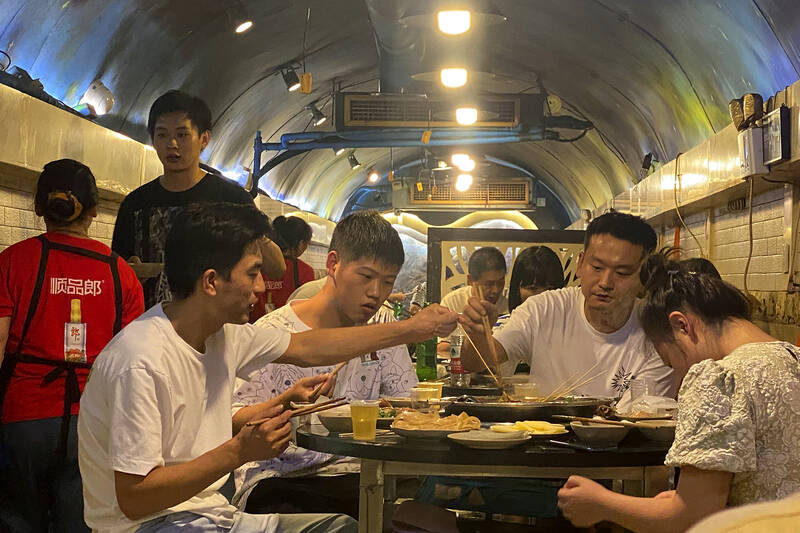The city of Chongqing, dubbed one of China’s four “furnace” cities, is known for both soaring temperatures and spicy cuisine — notably its hotpot, a peppery bubbling tabletop broth into which diners dunk bite-size pieces of food to cook and eat.
The inland metropolis on the Yangtze River has the perfect escape to enjoy hotpot, even in what has been a summer of unusually stifling heat: World War II-era air raid shelters, converted into restaurants, where the temperature is naturally cooler.
Locals call it “cave hotpot.”

Photo: AP
Chongqing was the temporary capital of China during World War II, as a Japanese invasion drove the government out of the then-capital, Nanjing, and occupied eastern China. Leader Chiang Kai-shek (蔣介石), the military, foreign diplomats and others set up in what was then a remote city in the southwest.
At the sound of air raid sirens, residents crowded into the often dark shelters dug into the hilly cityscape to protect people and military weapons. Thousands died in the Japanese aerial bombing attacks.
Today, the stone arch doorways of the former shelters still dot the city. Some have become cafes and mahjong parlors and others, restaurants.

Photo: AP
Red Chinese characters hang over one entrance, its stonework half-hidden by a refrigerated drinks display case and stacked up plastic chairs. The characters read: “Cave Pavilion Hotpot. Founded 1989.” Inside, tables and chairs line two long and narrow tunnels connected by a corridor. A starry night sky has been painted on the semicircular roof to reinforce a feeling of coolness. A painting of a World War II fighter plane hangs on the wall.
Diners drop beef tripe, meat, fish and vegetables into a bubbling broth filled with floating red chili peppers and lip-numbing Sichuan peppercorns. A non-spicy broth is also available — in a smaller container.
“We stay away from the summer heat in these air raid shelters,” said Tang Ronggang, as wisps of steam rose in front of his face from the hotpot on his table. “It’s cool in here, a good place to stay in summer.” Particularly this summer, which has seen what meteorologists are calling China’s strongest heat wave since the government began recording rainfall and temperature 61 years ago. High temperatures have persisted for more than two months, topping 40 degrees Celsius in many places.

Photo: AP
Shopping malls have closed in Chongqing for most of the daytime to conserve power. Wide swaths of the Yangtze and Jialing rivers, which meet in the city, have dried up, drawing people to the exposed riverbed. The extended heat and drought is blamed on a high-pressure system parked over western Russia that is also causing this summer’s heatwaves in Europe.
Chongqing, immediately east of Sichuan, was part of the province until the city and the surrounding area was broken off administratively in 1997.
Some date the city’s hotpot tradition to the 16th century, when porters ate meat and vegetables boiled with fiery spices after a hard day’s work on the docks on the Jialing River. The dish moved into abandoned air raid shelters in the 1970s, giving birth to a new tradition, the cave hotpot.

Not long into Mistress Dispeller, a quietly jaw-dropping new documentary from director Elizabeth Lo, the film’s eponymous character lays out her thesis for ridding marriages of troublesome extra lovers. “When someone becomes a mistress,” she says, “it’s because they feel they don’t deserve complete love. She’s the one who needs our help the most.” Wang Zhenxi, a mistress dispeller based in north-central China’s Henan province, is one of a growing number of self-styled professionals who earn a living by intervening in people’s marriages — to “dispel” them of intruders. “I was looking for a love story set in China,” says Lo,

It was on his honeymoon in Kuala Lumpur, looking out of his hotel window at the silvery points of the world’s tallest twin skyscrapers, that Frank decided it was time to become taller. He had recently confessed to his new wife how much his height had bothered him since he was a teenager. As a man dedicated to self-improvement, Frank wanted to take action. He picked up the phone, called a clinic in Turkey that specializes in leg lengthening surgery — and made a booking. “I had a lot of second thoughts — at the end of the day, someone’s going

In the next few months tough decisions will need to be made by the Taiwan People’s Party (TPP) and their pan-blue allies in the Chinese Nationalist Party (KMT). It will reveal just how real their alliance is with actual power at stake. Party founder Ko Wen-je (柯文哲) faced these tough questions, which we explored in part one of this series, “Ko Wen-je, the KMT’s prickly ally,” (Aug. 16, page 12). Ko was open to cooperation, but on his terms. He openly fretted about being “swallowed up” by the KMT, and was keenly aware of the experience of the People’s First Party

Standing on top of a small mountain, Kim Seung-ho gazes out over an expanse of paddy fields glowing in their autumn gold, the ripening grains swaying gently in the wind. In the distance, North Korea stretches beyond the horizon. “It’s so peaceful,” says the director of the DMZ Ecology Research Institute. “Over there, it used to be an artillery range, but since they stopped firing, the nature has become so beautiful.” The land before him is the demilitarized zone, or DMZ, a strip of land that runs across the Korean peninsula, dividing North and South Korea roughly along the 38th parallel north. This